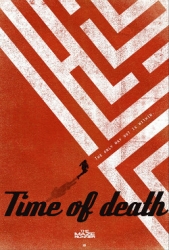A Death in Vienna

A Death in Vienna читать книгу онлайн
The sins of the past reverberate into the present, in an extraordinary novel by the new master of international suspense.
It was an ordinary-looking photograph. Just the portrait of a man. But the very sight of it chilled Allon to the bone.
Art restorer and sometime spy Gabriel Allon is sent to Vienna to authenticate a painting, but the real object of his search becomes something else entirely: to find out the truth about the photograph that has turned his world upside down. It is the face of the unnamed man who brutalized his mother in the last days of World War II, during the Death March from Auschwitz. But is it really the same one? If so, who is he? How did he escape punishment? Where is he now?
Fueled by an intensity he has not felt in years, Allon cautiously begins to investigate; but with each layer that is stripped away, the greater the evil that is revealed, a web stretching across sixty years and thousands of lives. Soon, the quest for one monster becomes the quest for many. And the monsters are stirring…
Rich with sharply etched characters and prose, and a plot of astonishing intricacy, this is an uncommonly intelligent thriller by one of our very best writers.
Внимание! Книга может содержать контент только для совершеннолетних. Для несовершеннолетних чтение данного контента СТРОГО ЗАПРЕЩЕНО! Если в книге присутствует наличие пропаганды ЛГБТ и другого, запрещенного контента - просьба написать на почту [email protected] для удаления материала
They started walking again. Ten minutes later, they were standing at the bottom of the ravine in a rocky streambed. A vehicle awaited them, concealed beneath a camouflage tarpaulin and pine branches. It was an old Rover with a spare tire mounted on the hood and jerry cans of extra fuel on the back.
The Americans chose the seating arrangements, Chiara in front, Gabriel in back, with a gun aimed at his stomach in the event he suddenly lost faith in the intentions of his rescuers. They lurched along the streambed for a few miles, splashing through the shallow water, before turning onto a dirt track. Several miles farther on, they came to the highway leading out of Puerto Blest. The American turned right, toward the Andes.
“You’re heading toward Chile,” Gabriel pointed out.
The Americans laughed.
Ten minutes later, the border: one guard, shivering in a brick blockhouse. The Rover shot across the frontier without slowing and headed down the Andes toward the Pacific.
AT THE NORTHERN END of the Gulf of Ancud lies Porto Montt, a resort town and cruise-ship port of call. Just outside the town is an airport with a runway long enough to accommodate a Gulfstream G500 executive jet. It was waiting on the tarmac, engines whining, when the Rover arrived. A gray-haired American stood in the doorway. He welcomed Gabriel and Chiara aboard and introduced himself with little conviction as “Mr. Alexander.” Gabriel, before settling himself into a comfortable leather seat, asked where they were going. “We’re going home, Mr. Allon. I suggest you and your friend try to get some rest. It’s a long flight.”
THE CLOCKMAKER DIALED the number in Vienna from his hotel room in Bariloche.
“Are they dead?”
“I’m afraid not.”
“What happened?”
“To be perfectly honest,” said the Clockmaker, “I don’t have a fucking clue.”
28 THE PLAINS, VIRGINIA
THE SAFE HOUSE is located in a corner of the Virginia horse country where wealth and privilege meet the hard reality of rural southern life. It is reached by way of a twisting, rolling roadway lined with tumbledown barns and clapboard bungalows with broken cars in the yards. There is a gate; it warns that the property is private, but omits the fact that, technically speaking, it is a government facility. The drive is gravel and nearly a mile in length. To the right is a thick wood; to the left, a pasture surrounded by a split-rail fence. The fence caused something of a scandal among the local craftsmen when the “owner” hired an outside firm to handle the construction. Two bay horses reside in the pasture. According to Agency wits, they are subjected, like all other employees, to annual polygraphs to make certain they haven’t gone over to the other side, whatever side that might be.
The Colonial-style house is located at the top of the property and surrounded by towering shade trees. It has a copper roof and a double porch. The furnishings are rustic and comfortable, inviting cooperation and camaraderie. Delegations from friendly services have stayed there. So have men who have betrayed their country. The last was an Iraqi who helped Saddam try to build a nuclear bomb. His wife was hoping for an apartment in the famous Watergate and complained bitterly throughout her stay. His sons set fire to the barn. Management was pleased to see them leave.
On that afternoon, new snowfall covered the pasture. The landscape, drained of all color by the heavily tinted windows of the hulking Suburban, appeared to Gabriel as a charcoal sketch. Alexander, reclining in the front seat with his eyes closed, came suddenly awake. He yawned elaborately and squinted at his wristwatch, then frowned when he realized it was set to the wrong time.
It was Chiara, seated at Gabriel’s side, who noticed the bald, sentinel-like figure standing at the balustrade on the upper porch. Gabriel leaned across the back seat and peered up at him. Shamron raised his hand and held it aloft for a moment before turning and disappearing into the house.
He greeted them in the entrance hall. Standing at his side, dressed in corduroy trousers and a cardigan sweater, was a slight man with a halo of gray curls and a gray mustache. His brown eyes were tranquil, his handshake cool and brief. He seemed a college professor, or perhaps a clinical psychologist. He was neither. Indeed, he was the deputy director for operations of the Central Intelligence Agency, and his name was Adrian Carter. He did not look pleased, but then, given the current state of global affairs, he rarely did.
They greeted each other carefully, as men of the secret world are prone to do. They used real names, since they were all known to each other and the use of work names would have lent a farcical air to the affair. Carter’s serene gaze settled briefly on Chiara, as though she were an uninvited guest for whom an extra place would have to be set. He made no attempt to suppress his frown.
“I was hoping to keep this at a very senior level,” Carter said. His voice was underpowered; to hear him, one had to remain still and listen carefully. “I was also hoping to limit distribution of the material I’m about to share with you.”
“She’s my partner,” Gabriel said. “She knows everything, and she’s not leaving the room.”
Carter’s eyes moved slowly from Chiara to Gabriel “We’ve been watching you for some time-ever since your arrival in Vienna, to be precise. We especially enjoyed your visit to Café Central. Confronting Vogel face to face like that was a fine piece of theater.”
“Actually, it was Vogel who confronted me. ”
“That’s Vogel’s way.”
“Who is he?”
“You’re the one who’s been digging. Why don’t you tell me?”
“I believe he’s an SS murderer named Erich Radek, and for some reason, you’re protecting him. If I had to guess why, I’d say he was one of your agents.”
Carter placed a hand on Gabriel’s shoulder. “Come,” he said. “Obviously, it’s time we had a talk.”
THE LIVING ROOM was lamplit and shadowed. A large fire burned in the hearth, an institutional metal urn of coffee stood on the sideboard. Carter helped himself to some before settling with donnish detachment into a wingchair. Gabriel and Chiara shared the couch while Shamron paced the perimeter, a sentry with a long night ahead of him.
“I want to tell you a story, Gabriel,” Carter began. “It’s a story about a country that was drawn into a war it didn’t want to fight, a country that defeated the greatest army the world had ever known, only to find itself, within a matter of months, in an armed standoff with its former ally, the Soviet Union. In all honesty, we were scared shitless. You see, before the war, we had no intelligence service-not areal one, anyway. Hell, your service is as old as ours. Before the war, our intelligence operation inside the Soviet Union consisted of a couple of guys from Harvard and a teletype machine. When we suddenly found ourselves nose to nose with the Russian bogeyman, we didn’t know shit about him. His strengths, his weaknesses, his intentions. And what’s more, we didn’t know how to find out. That another war was imminent was a foregone conclusion. And what did we have? Fuck all. No networks, no agents. Nothing. We were lost, wandering in the desert. We needed help. Then a Moses appeared on the horizon, a man to lead us across Sinai, into the Promised Land.”
Shamron went still for a moment in order to supply the name of this Moses: General Reinhard Gehlen, head of the German General Staff’s Foreign Armies East branch, Hitler’s chief spy on the Russian front.
“Buy that man a cigar.” Carter inclined his head toward Shamron. “Gehlen was one of the few men who had the balls to tell Hitler the truth about the Russian campaign. Hitler used to get so pissed at him, he threatened to have him committed to an insane asylum. As the end was drawing near, Gehlen decided to save his own skin. He ordered his staff to microfilm the General Staff’s archives on the Soviet Union and seal the material in watertight drums. The drums were buried in the mountains of Bavaria and Austria, then Gehlen and his senior staff surrendered to a Counterintelligence Corps team.”























